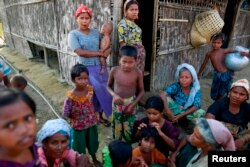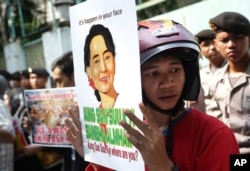In Myanmar’s western Rakhine state, inter-communal violence in 2012 caused a surge of killings, arson attacks and mob violence that led tens of thousands of mostly Muslim Rohingya to seek refuge in camps or flee the country by boat. Since then, the violence has ebbed, but thousands remain in squalid camps. There are now signs of hope that the community is starting to reconcile.
For three years, Rakhine has been synonymous with violence and human misery. Violence between communities largely broke down along sectarian and ethnic lines, with Buddhist villagers facing off against mostly Muslim ethnic Rohingya. It led around 140,000 people to flee their homes for government controlled areas and camps backed by nongovernment organizations.
Conditions in U.N. Refugee Agency camps have continued to deteriorate ever since.
But two Australian academics who've been studying the community say a recent survey indicates growing support for reconciliation on both sides.
Anthony Ware and Ronan Lee from Melbourne’s Deakin University carried out a study based on interviews with 600 people and community leaders in Rakhine state.
“We discovered that there was much more sympathy on the part of both communities for the other community and the situation the others found themselves in," Lee said. "There was, I think, a surprising degree of flexibility on the part of both communities in terms of accepting the other and its rights and its role."
Rohingya are not a recognized ethnic group of Myanmar, also known as Burma, and so lack citizenship. They were not allowed to vote in the country’s recent election. The United Nations High Commission for Refugees (UNHCR) estimated more than 800,000 individuals in Rakhine State lack citizenship.
Myanmar’s central government and Rakhine Buddhist communities oppose the use of the name “Rohingya,” a disputed term that covers some 1.3 million Muslims living largely in northern Rakhine townships.
But Lee says while those in the Muslim community still wish to be considered as "Rohingya" in any move to formal identification, many are ready to be flexible, but reject any use of the term "Bengali" referred to in government circles.
Citizenship issue
“What’s actually going on is that there is a difference of opinion as to which group of people should be allowed to use the name ‘Rohingya’. But then when you ask the Muslims how much do you believe that the name Rohingya is really, really important to your identity, their attitude was very much; ‘look we just want our rights and our citizenship – we want to be part of Myanmar – we have lived here for generations, we have a heritage here that goes back hundreds of years,’” said Lee.
Apart from the citizenship issue, researchers found common ground among both Buddhists and Muslims.
Both communities have suffered because of the violence, at the same time that the broader economy in Myanmar has been buoyed by outside investment and energized economic activity encouraged by the country’s political opening.
Lee says there is a sense on both sides that Rakhine is being left behind by Myanmar’s economic revival, in part because investors have been wary of the region’s instability.
Economic interdependence
Lee says both sides are very much economically interdependent. Buddhists work in agriculture and the Muslim community has been involved in fishing and commerce.
Sean Turnell from Sydney’s Macquarie University says the academics’ assessment offers hope for the region’s future given the past backdrop of violence.
“I would imagine if you can see some [economic] assistance provided and it’s transparent in a way that various jealousies and tensions arising from that may not take place that seems to me, as I say, quite at least a little bit hopeful,” he said.
For now, the community, like the rest of Myanmar, is looking to Aung San Suu Kyi and her National League for Democracy (NLD) to see what the country’s incoming political power has planned. Aung San Suu Kyi has said that giving citizenship to Rohingya is not a priority for her administration, but her plans for economic development could help this fractured community heal.







